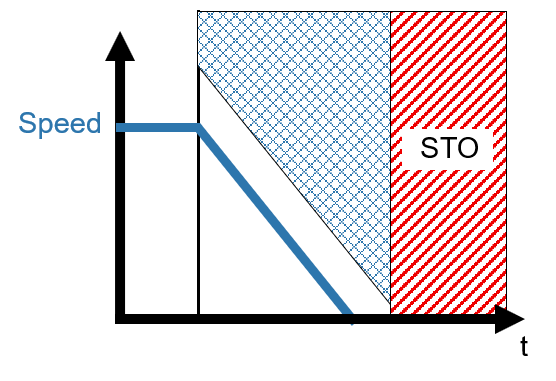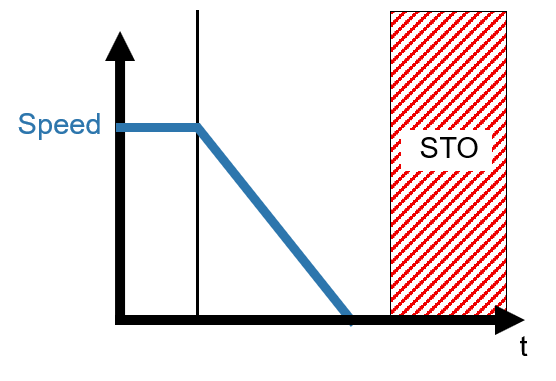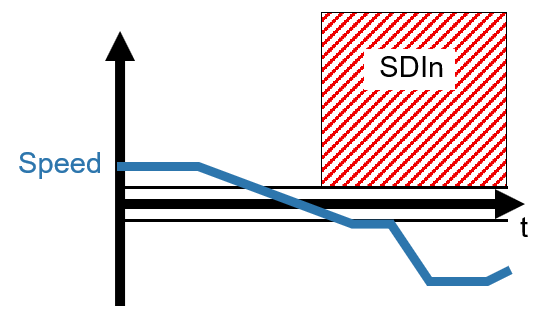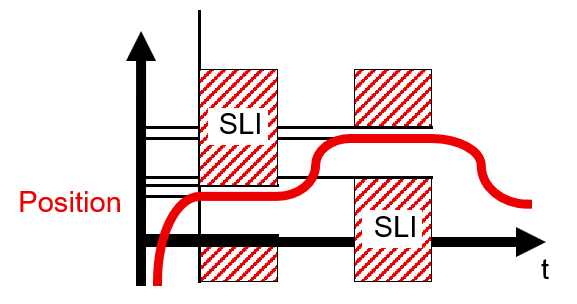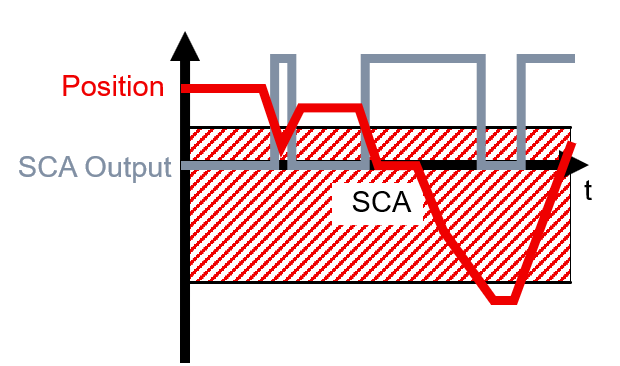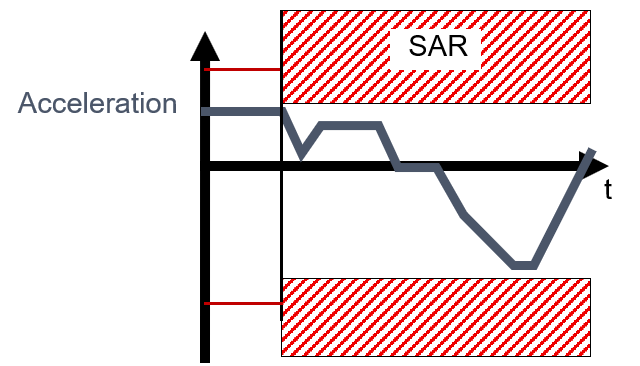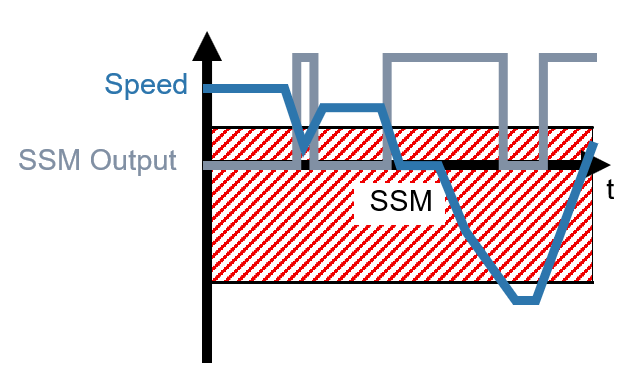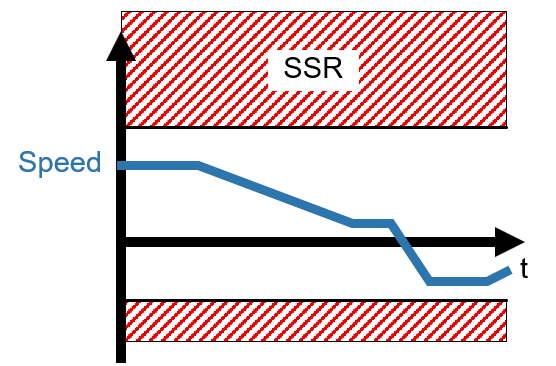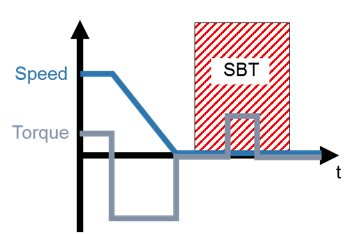Products
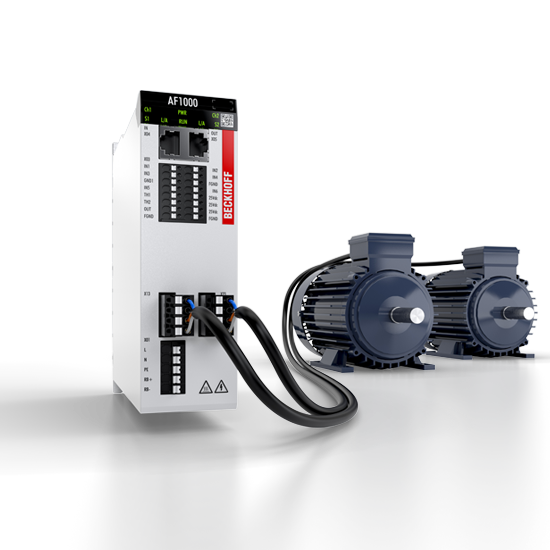
AF1000 | Economy variable frequency drive
The variable frequency drives in the AF1000 series are particularly suitable for performing basic drive tasks cost-effectively.
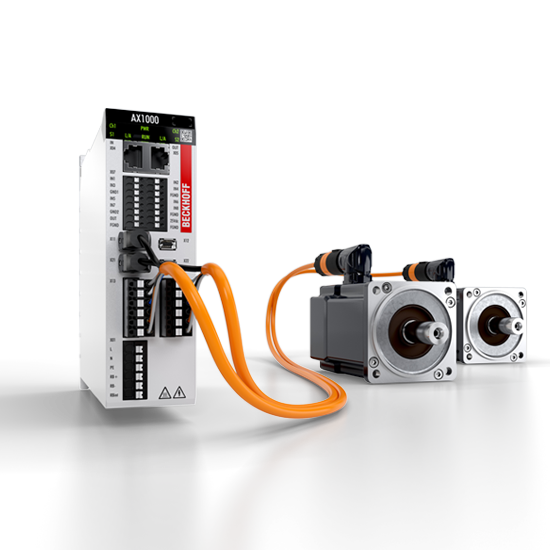
AX1000 | Economy servo drive
The AX1000 economy servo drive for implementing demanding and cost-sensitive drive tasks.
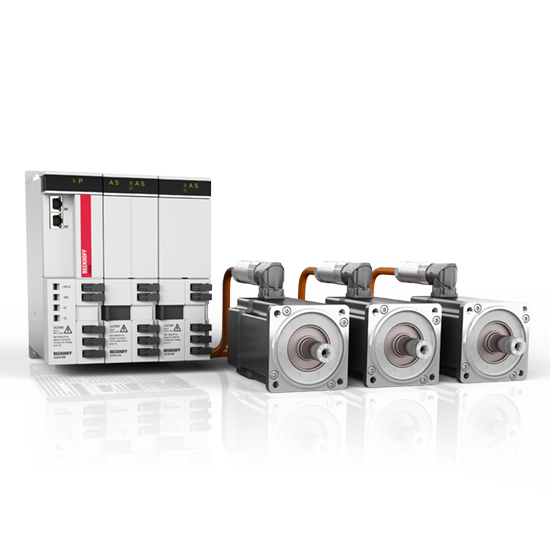
AX8000 | Multi-axis Servo System
The AX8000 is the space-saving solution for applications with more than two axes. Extensive TwinSAFE functions allow a safe machine design.
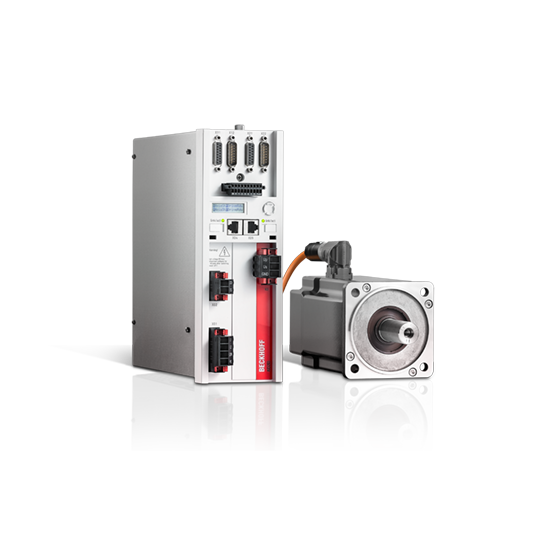
AX5000 | Digital Compact Servo Drives
The AX5000 is offered in a wide performance range and offers a flexible motor and feedback interface as well as optional TwinSAFE functions.
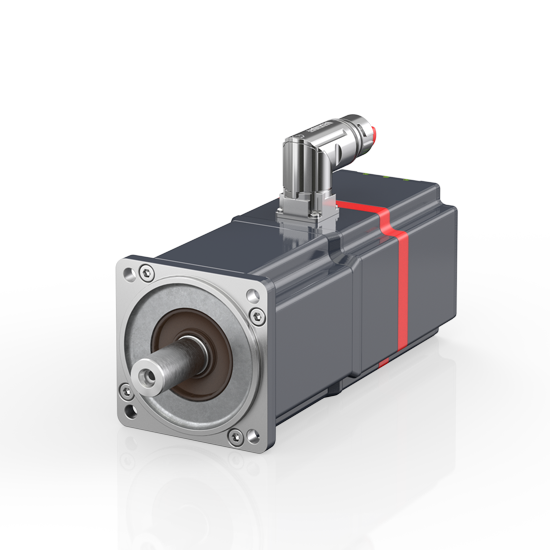
AMP8000 | Distributed Servo Drives
Synchronous servomotor with integrated servo drive for the realization of modular machine concepts without a control cabinet.

AMP8500 | Distributed servo drives with increased rotor moment of inertia
Synchronous servomotor with integrated servo drive for the realization of modular machine concepts without a control cabinet.
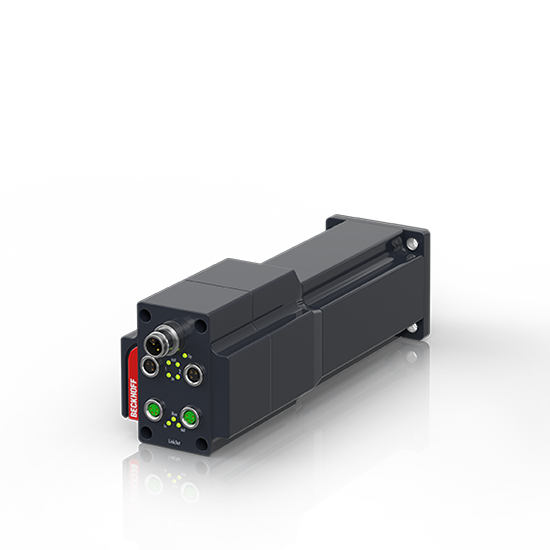
AMI8100 | Compact integrated Servo Drives
Synchronous servomotor with integrated servo drive for the realization of machine concepts without a control cabinet in the low voltage range.
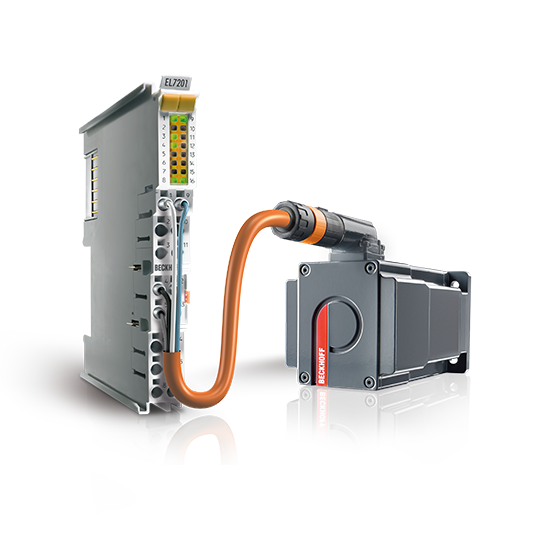
I/O components
The I/O components in different protection classes enable the operation of stepper, DC and servomotors in a compact design.
TwinSAFE safe Motion
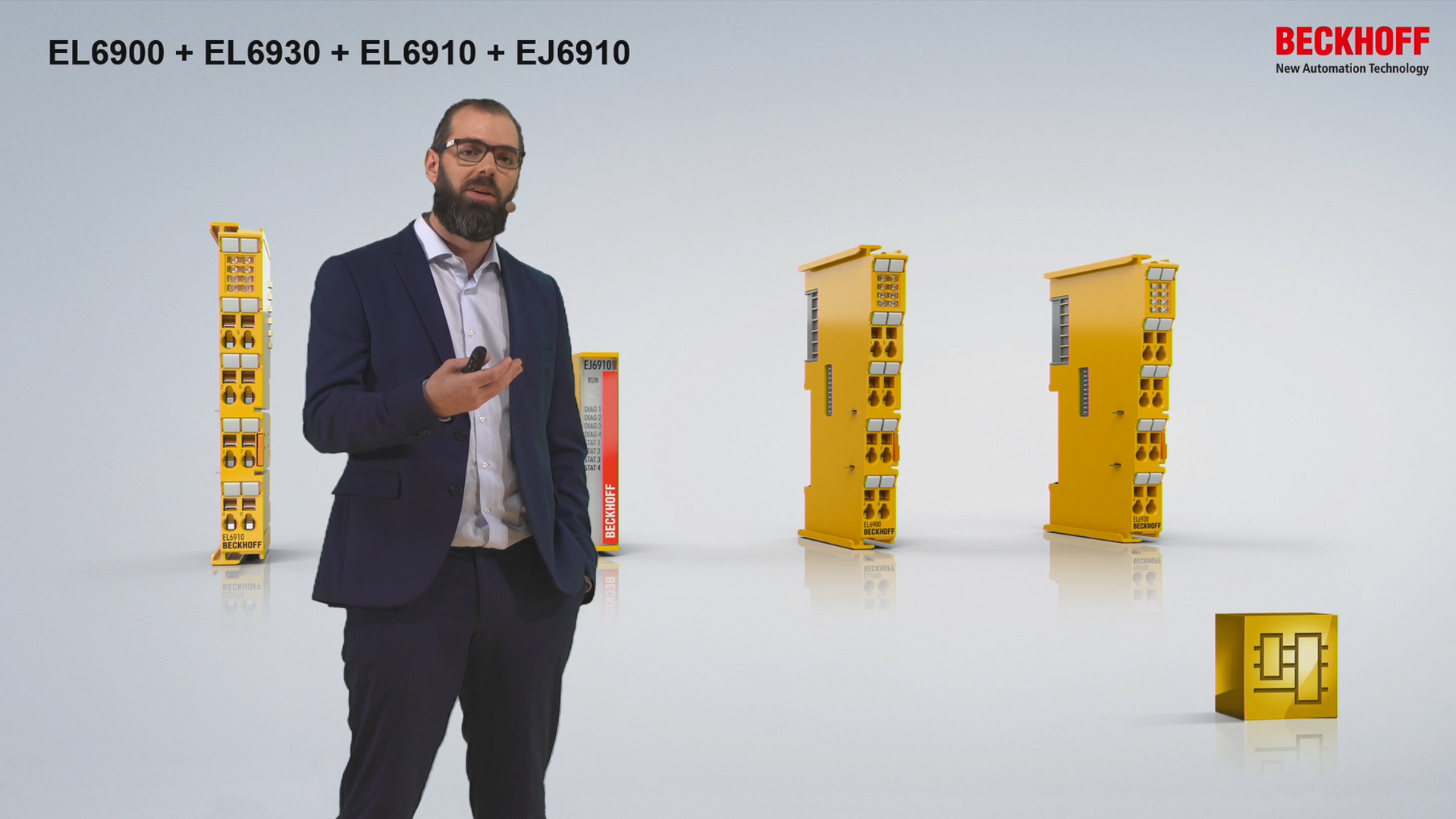
Dynamic movements of the electrical drive technology used in a machine can create considerable hazards to people and the environment. From a normative point of view, drive technology components must be considered in a safety-oriented manner by co-ordinating and monitoring certain movements and motion sequences. The integrated safety solution TwinSAFE enables the implementation of safe drive technology in three levels corresponding to the complexity of the machine. The safe drive components are able to switch the motor torque-free or to monitor speed, position and direction of rotation. No further devices such as contactors or circuit breakers are necessary in the supply lines for this. This enables a very lean installation and helps to lower costs and control cabinet space requirements. Even safe position monitoring or position range monitoring is simple to implement with the aid of the safe drive technology. This does not require any additional wiring, because the EtherCAT communication is used in the servo drives, enabling seamless communication between TwinSAFE Logic components and the safe drive technology.
Like the programming or configuration of a safety application, the entire parameterisation of the safe drive technology is performed from the TwinCAT software. All system-specific settings are stored together with the application in the TwinSAFE Logic components. For that reason, the safe drive components can be exchanged at any time without software modification. The respective component receives all the parameters necessary for operation at the next power-on or boot-up.
Safe Motion functions implemented with the aid of TwinSAFE: The safe motion technology
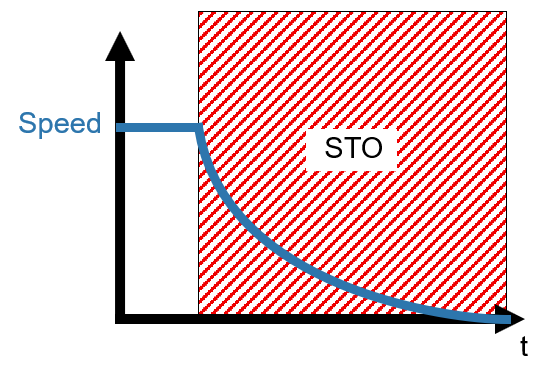
- STO: Safe Torque Off
- corresponds to Stop Category 0 according to EN 60204
- All torque-generating energy is cut off immediately.
- typical applications: emergency stop, maintenance, commissioning
- SS1: Safe Stop 1
- corresponds to Stop Category 1 according to EN 60204
- Drive is ramped down to a stop and after a configured delay STO is activated.
- differentiation between SS1-r and SS1-t
- typical applications: controlled stop of the drive to preserve mechanics
- SOS: Safe Operating Stop
- Drive is safely monitored at a particular position. If drive violates the allowed position window, a failsafe reaction is triggered.
- typical applications: manual user interaction in hazard area
- SS2: Safe Stop 2
- corresponds to Stop Category 2 according to EN 60204
- SS2-r (with AX8000-x2xx)
- Drive is ramped down to a stop and stays safely controlled in stop. If safe monitoring is triggered, a failsafe reaction is activated.
- typical applications: controlled stop of the drive to preserve mechanics and being able to start up again quickly
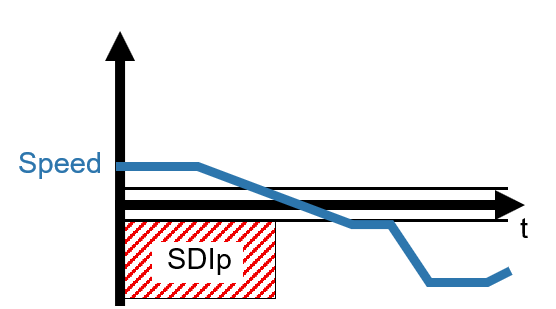
- SDIp: Safe Direction positive
- Positive direction of drive movement is safely monitored. If direction changes, a failsafe reaction is triggered.
- typical applications: safe monitoring of the opening movement of a press to allow manual entering of the danger area
- SDIn: Safe Direction negative
- Negative direction of drive movement is safely monitored. If direction changes, a failsafe reaction is triggered.
- typical applications: safe monitoring of the opening movement of a press to allow manual entering of the danger area
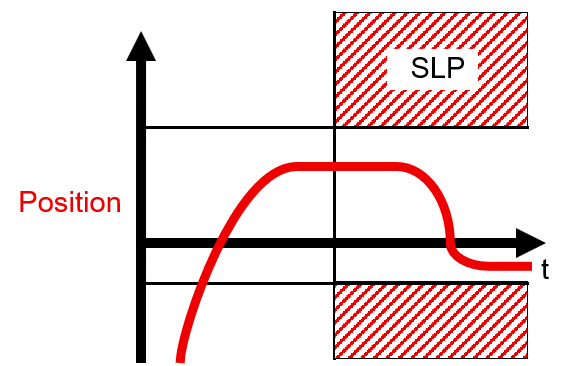
- SLP: Safely-limited Position
- Absolute position in a particular position window is safely monitored. If drive violates the allowed position window, a failsafe reaction is triggered.
- typical applications: manual user interaction in hazard area
- SLI: Safely-limited Increment
- Position monitoring in a particular position window relative to the position when activated. If drive violates the allowed position window, a failsafe reaction is triggered.
- typical applications: manual user interaction in hazard area
- SCA: Safe CAM
- Monitors position based on a software cam. If drive is within defined window, the function sets the Safe CAM signal.
- typical applications: manual user interaction in hazard area
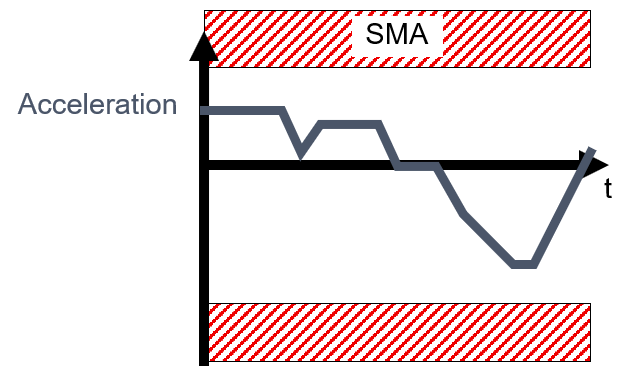
- SMA: Safe Maximum Acceleration
- Absolute acceleration is safely limited to a positive and negative maximum. If drive violates the limit, a failsafe reaction is triggered.
- typical applications: preserve user and mechanics
- SAR: Safe Acceleration Range
- Absolute acceleration is safely limited to a positive and negative maximum. If drive violates the limit, a failsafe reaction is triggered:
- typical applications: preserve user and mechanics
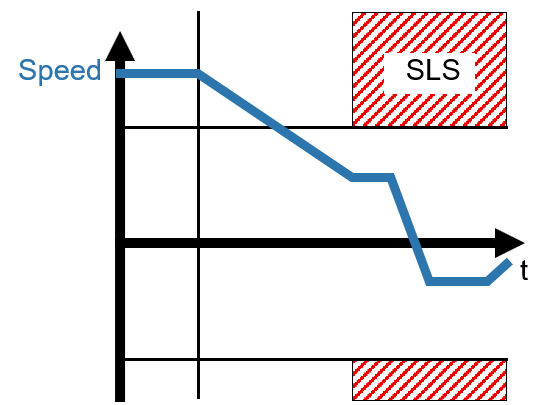
- SLS: Safely-limited Speed
- Absolute speed is safely limited to a specified speed window. If drive violates the limit, a failsafe reaction is triggered.
- typical applications: preserve user and mechanics
- SSM: Safe Speed Monitor
- Absolute speed is safely limited to a lower positive and negative limit. If drive violates the limit, a failsafe reaction is triggered.
- typical applications: reaction to a blocked motor
- SMS: Safe Maximum Speed
- Absolute speed is safely limited to a positive and negative maximum. If drive violates the limit, a failsafe reaction is triggered.
- typical applications: preserve user and mechanics
- SSR: Safe Speed Range
- Absolute speed is safely limited to a positive and negative maximum. If drive violates the limit, a failsafe reaction is triggered.
- typical applications: preserve user and mechanics

- SBC: Safe Brake Control
- safe activation of an external brake to ensure no movement of moved loads after STO
- typical applications: ensure stop of movement for down coasting loads after STO
- SBT: Safe Brake Test
- safe test of an external brake to ensure functionality of a brake subject to wear
- typical applications: ensure stop of movement for down coasting loads after STO
TwinSAFE safe drive technology
| Product | AMP8000/AMP8500 | AX1000/AX8000 | AX5805/AX5806 | AF1000/AX5801 | |||||
|---|---|---|---|---|---|---|---|---|---|
| Function | EN 61508:2010 | EN ISO 13849-1:2015 | EN 61508:2010 | EN ISO 13849-1:2015 | EN 61508:2010 | EN ISO 13849-1:2015 | EN 61508:2010 | EN ISO 13849-1:2015 | |
| Stop functions | STO | SIL 3 | Cat. 4, PL e | SIL 3 | Cat. 4, PL e | SIL 3 | Cat. 4, PL e | SIL 3 | Cat. 4, PL e |
| SS1 | SIL 3 | Cat. 4, PL e | SIL 3 | Cat. 4, PL e | SIL 3 | Cat. 4, PL e | SIL 3 | Cat. 4, PL e | |
| SOS | SIL 2 | Cat. 3, PL d | SIL 3 | Cat. 4, PL e | SIL 3 | Cat. 4, PL e | - | - | |
| SS2 | SIL 2 | Cat. 3, PL d | SIL 3 | Cat. 4, PL e | SIL 3 | Cat. 4, PL e | - | - | |
| Rotating direction functions | SDIp | SIL 2 | Cat. 3, PL d | SIL 3 | Cat. 4, PL e | SIL 3 | Cat. 4, PL e | - | - |
| SDIn | SIL 2 | Cat. 3, PL d | SIL 3 | Cat. 4, PL e | SIL 3 | Cat. 4, PL e | - | - | |
| Position functions | SLP | SIL 2 | Cat. 3, PL d | SIL 3 | Cat. 4, PL e | SIL 3 | Cat. 4, PL e | - | - |
| SLI | SIL 2 | Cat. 3, PL d | SIL 3 | Cat. 4, PL e | SIL 3 | Cat. 4, PL e | - | - | |
| SCA | SIL 2 | Cat. 3, PL d | SIL 3 | Cat. 4, PL e | SIL 3 | Cat. 4, PL e | - | - | |
| Acceleration functions | SMA | SIL 2 | Cat. 3, PL d | SIL 3 | Cat. 4, PL e | SIL 3 | Cat. 4, PL e | - | - |
| SAR | SIL 2 | Cat. 3, PL d | SIL 3 | Cat. 4, PL e | SIL 3 | Cat. 4, PL e | - | - | |
| Speed functions | SLS | SIL 2 | Cat. 3, PL d | SIL 3 | Cat. 4, PL e | SIL 3 | Cat. 4, PL e | - | - |
| SSM | SIL 2 | Cat. 3, PL d | SIL 3 | Cat. 4, PL e | SIL 3 | Cat. 4, PL e | - | - | |
| SMS | SIL 2 | Cat. 3, PL d | SIL 3 | Cat. 4, PL e | SIL 3 | Cat. 4, PL e | - | - | |
| SSR | SIL 2 | Cat. 3, PL d | SIL 3 | Cat. 4, PL e | SIL 3 | Cat. 4, PL e | - | - | |
| Brake functions | SBC | SIL 3 | Cat. 4, PL e | SIL 3 | Cat. 4, PL e | - | - | - | - |
| SBT | supports | supports | supports | supports | - | - | - | - | |
TwinSAFE safe drive technology (Compact drive technology)
| Product | AMI8000 | ELM72xx | EL72xx/EP72xx/EJ72xx | ||||
|---|---|---|---|---|---|---|---|
| Function | EN 61508:2010 | EN ISO 13849-1:2015 | EN 61508:2010 | EN ISO 13849-1:2015 | EN 61508:2010 | EN ISO 13849-1:2015 | |
| Stop functions | STO | SIL 3 | Cat. 4, PL e | SIL 3* | Cat. 4, PL e* | SIL 2 | Cat. 3, PL d |
| SS1 | SIL 3 | Cat. 4, PL e | SIL 3* | Cat. 4, PL e* | - | - | |
| SOS | - | - | SIL 3* | Cat. 4, PL e* | - | - | |
| SS2 | - | - | SIL 3* | Cat. 4, PL e* | - | - | |
| Rotating direction functions | SDIp | - | - | SIL 3* | Cat. 4, PL e* | - | - |
| SDIn | - | - | SIL 3* | Cat. 4, PL e* | - | - | |
| Position functions | SLP | - | - | SIL 3* | Cat. 4, PL e* | - | - |
| SLI | - | - | SIL 3* | Cat. 4, PL e* | - | - | |
| SCA | - | - | SIL 3* | Cat. 4, PL e* | - | - | |
| Acceleration functions | SMA | - | - | SIL 3* | Cat. 4, PL e* | - | - |
| SAR | - | - | SIL 3* | Cat. 4, PL e* | - | - | |
| Speed functions | SLS | - | - | SIL 3* | Cat. 4, PL e* | - | - |
| SSM | - | - | SIL 3* | Cat. 4, PL e* | - | - | |
| SMS | - | - | SIL 3* | Cat. 4, PL e* | - | - | |
| SSR | - | - | SIL 3* | Cat. 4, PL e* | - | - | |
| Brake functions | SBC | - | - | - | - | - | - |
| SBT | - | - | - | - | - | - | |
